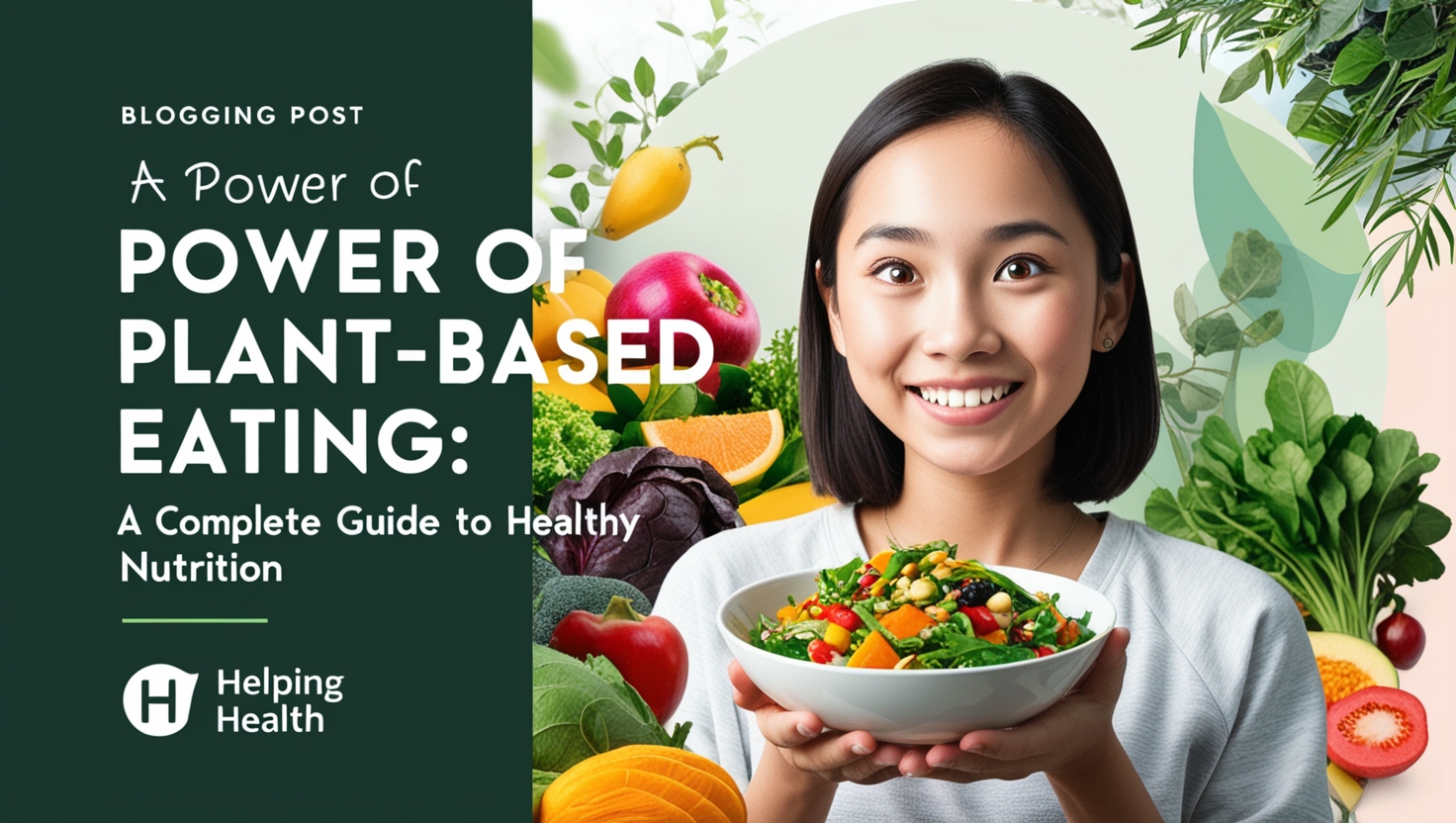
The Power of Plant-Based Eating: A Complete Guide to Healthy Nutrition
Healthy eating is no longer just about counting calories—it’s about nourishing the body with the right balance of nutrients, minerals, and vitamins. In recent years, plant-based diets have gained worldwide attention for their proven benefits in boosting energy, preventing chronic diseases, and supporting sustainable living.
This article will walk you through the essentials of a plant-based lifestyle, including the health benefits, a complete meal plan, practical shopping
tips, and answers to common questions. Whether you are trying to lose weight, improve digestion, or simply eat more mindfully, this guide will help you make confident and lasting changes to your daily nutrition.
Why Healthy Eating Matters
A balanced diet is the foundation of long-term health. It strengthens the immune system, regulates blood sugar, supports brain function, and reduces the risk of heart disease. Unfortunately, busy lifestyles, processed foods, and poor dietary choices often lead to nutrient deficiencies and fatigue.
Healthy eating is about more than just eliminating junk food—it’s about building a relationship with food that is intentional and supportive of your well-being. By focusing on whole, plant-based foods, you can supply your body with essential nutrients in the most natural way possible.
Benefits of Plant-Based Eating
Adopting a diet centered around fruits, vegetables, legumes, nuts, and whole grains offers a variety of scientifically proven health benefits:
-
Supports Weight Management
Plant-based meals are naturally high in fiber and low in calories, making it easier to feel full without overeating. -
Improves Heart Health
Fiber-rich foods reduce cholesterol levels and lower the risk of hypertension. -
Boosts Energy Levels
Whole foods provide steady energy throughout the day, unlike refined carbs that cause spikes and crashes. -
Prevents Chronic Illness
Studies show plant-based diets can reduce the risk of type 2 diabetes, certain cancers, and digestive problems. -
Promotes Longevity
Populations with higher intake of vegetables and legumes are shown to live longer, healthier lives.
A Sample 7-Day Healthy Eating Plan
Here’s a beginner-friendly meal plan to help you transition into a healthier lifestyle:
Day 1
-
Breakfast: Overnight oats with almond milk, chia seeds, and berries.
-
Lunch: Lentil soup with a whole-grain bread slice.
-
Dinner: Stir-fried vegetables with brown rice.
Day 2
-
Breakfast: Green smoothie with spinach, banana, and flaxseed.
-
Lunch: Quinoa salad with chickpeas and avocado.
-
Dinner: Sweet potato and black bean tacos.
Day 3
-
Breakfast: Whole-grain toast with peanut butter and banana slices.
-
Lunch: Grilled vegetable wrap with hummus.
-
Dinner: Baked eggplant with tomato sauce and lentils.
Day 4
-
Breakfast: Greek yogurt with walnuts and honey.
-
Lunch: Brown rice with stir-fried tofu and broccoli.
-
Dinner: Butternut squash soup with quinoa crackers.
Day 5
-
Breakfast: Smoothie bowl with mango, granola, and pumpkin seeds.
-
Lunch: Chickpea curry with basmati rice.
-
Dinner: Zucchini noodles with avocado pesto.
Day 6
-
Breakfast: Oat pancakes topped with blueberries.
-
Lunch: Vegetable burrito with brown beans.
-
Dinner: Grilled portobello mushrooms with roasted potatoes.
Day 7
-
Breakfast: Fresh fruit salad with sunflower seeds.
-
Lunch: Spinach and lentil stew with millet.
-
Dinner: Cauliflower rice stir-fry with edamame.
Smart Grocery Shopping Tips
Switching to healthy eating becomes easier when you shop with intention. Here are some practical tips:
-
Shop the perimeter: Fresh produce, dairy, and whole foods are usually at the outer aisles of grocery stores.
-
Read labels carefully: Look for whole ingredients and avoid added sugars or hydrogenated oils.
-
Buy seasonal produce: It’s fresher, cheaper, and often more nutrient-dense.
-
Stock up on staples: Keep oats, rice, lentils, and nuts on hand for quick meals.
-
Plan ahead: Make a weekly shopping list to avoid impulse purchases.
Common Mistakes to Avoid
While trying to eat healthy, many people unknowingly make mistakes:
-
Relying too much on processed “healthy” snacks – Not all products labeled healthy are truly nutritious.
-
Skipping protein – Even in a plant-based diet, protein sources like lentils, beans, and quinoa are essential.
-
Not drinking enough water – Hydration is equally important as food choices.
-
Lack of meal planning – Without planning, it’s easier to fall back on unhealthy options.
Frequently Asked Questions
1. Can a plant-based diet provide enough protein?
Yes. Foods like beans, lentils, tofu, quinoa, nuts, and seeds are excellent protein sources.
2. Is healthy eating expensive?
Not necessarily. Seasonal vegetables, bulk grains, and legumes are often more affordable than processed foods.
3. Can children follow this diet?
Absolutely, as long as meals are balanced with proper nutrients. Consult a pediatrician for specific needs.
4. How quickly will I see results?
Many people notice more energy within a week. Long-term benefits such as weight control or improved cholesterol may take a few months.
Practical Tips for Staying Consistent
-
Prepare meals in advance to save time.
-
Keep healthy snacks like nuts or fruit handy.
-
Focus on adding variety to avoid boredom.
-
Eat mindfully—chew slowly and avoid distractions.
-
Allow flexibility; occasional indulgence won’t harm progress.
Conclusion
Healthy eating is a powerful tool for long-term wellness. A plant-based, nutrient-rich diet not only supports physical health but also boosts mental clarity and overall quality of life. By making small, consistent changes—like swapping processed snacks for whole foods or adding vegetables to every meal—you can transform your relationship with food.
Start with simple steps today, and in a matter of weeks, you’ll notice more energy, better digestion, and a sense of balance. Nourishing your body doesn’t have to be complicated; it only takes commitment and mindful choices.
